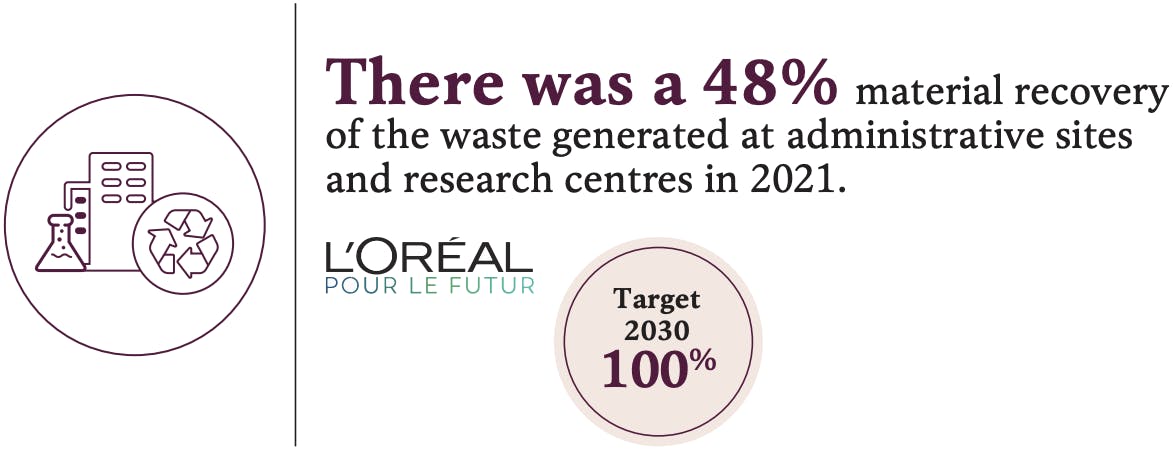Achievement of the “zero waste to landfill” target is part of the more global circular economy approach the Group is engaged in. As far as possible, L’Oréal seeks to promote the local treatment of waste, in order to reduce the environmental impact and to create potential synergies with other local stakeholders.
In 2021, waste sent to landfill due to regulatory requirements totalled 13 tonnes for the factories and distribution centres☑ and 145 tonnes for the administrative sites and research centres.

☑ The Statutory Auditors have expressed reasonable assurance about this indicator.
97% of the waste was recovered in 2021 for the industrial sites☑ i.e. 1 point more than in 2019 (10 points more than in 2005). 23 factories and 24 distribution centres had a recovery rate of 100% in 2021☑.
In 2021, 59% of the waste generated by industrial sites was reused or recycled (material recovery)☑.
3% of waste was destroyed without recovery (incineration without energy recovery) in 2021, representing 3,238 tonnes☑.

92% of the waste was recovered in 2021 for the administrative sites and research centres, 4 points more than in 2019 (8 points more than in 2016). 40 administrative sites and 6 research centres had a recovery rate of 100% in 2021.
48% of the waste generated was reused or recycled (material recovery) in 2021.
6% of waste was destroyed without recovery (incineration without energy recovery) in 2021, representing 282 tonnes.
4.3.1.2. Involving suppliers in the Group’s transformation
The Group’s commitment to and actions with its suppliers during the Covid-19 health crisis
L’Oréal mobilised heavily at the beginning of the Covid-19 health crisis by launching solidarity actions, believing that it must take action with its stakeholders.
The Group also supported its partners by sharing best practices for health measures with them and set up a solidarity fund to assist the local communities of its Solidarity Sourcing programme (farmers, collectors) within the framework of the needs identified by NGOs in the field.
The collaboration with its suppliers, which was in line with the values and raison d’être of L’Oréal, enabled the Group to continue its activities in this extraordinary situation and to strengthen its relationships with suppliers.
Above and beyond its strict requirements with regard to its own sites, L’Oréal has for a number of years applied an environmental policy throughout its value chain.
Indeed, L’Oréal works in partnership with its suppliers to improve the environmental and social profile of its products via the eco-design and sustainable sourcing of packaging, ingredients and formulas and their method of transportation. This worldwide ecosystem covers all the Group’s needs for packaging, raw materials, subcontracting, production equipment, promotional and advertising articles, etc. The commitment and performance of this ecosystem is crucial to the Group’s fulfilment of its commitments.
☑The Statutory Auditors have expressed reasonable assurance about this indicator.
